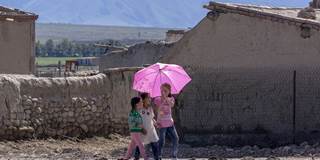Over the last 35 years, China has lifted more than 800 million people out of poverty, and is now committed to doing the same for the remaining 45 million living in rural poverty by 2020. But that will be more difficult and costly than ever, and even when it's done, China will face a growing number of urban poor.
BEIJING – One of the most cited statistics about China may well be the number of Chinese who have been lifted out of poverty over the last 35 years. At over 800 million, it is a huge number – and an extraordinary feat. Indeed, no other country has achieved such a level of poverty reduction in such a short period. But what about the millions of Chinese who have remained behind?

BEIJING – One of the most cited statistics about China may well be the number of Chinese who have been lifted out of poverty over the last 35 years. At over 800 million, it is a huge number – and an extraordinary feat. Indeed, no other country has achieved such a level of poverty reduction in such a short period. But what about the millions of Chinese who have remained behind?